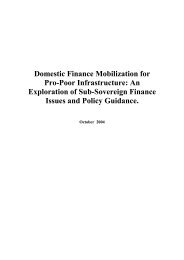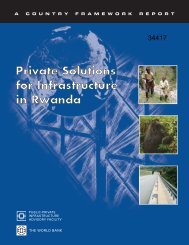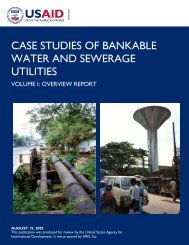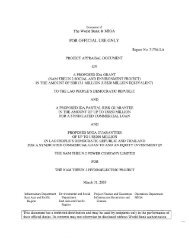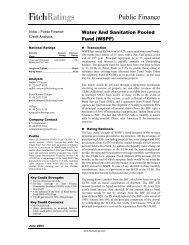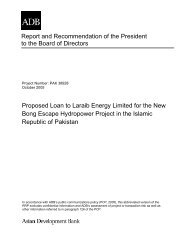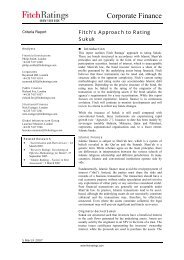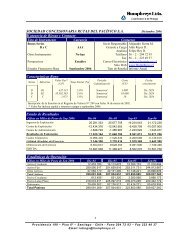EAP - The Pacific Infrastructure Challenge - World Bank (2006).pdf
EAP - The Pacific Infrastructure Challenge - World Bank (2006).pdf
EAP - The Pacific Infrastructure Challenge - World Bank (2006).pdf
You also want an ePaper? Increase the reach of your titles
YUMPU automatically turns print PDFs into web optimized ePapers that Google loves.
Air services would also benefit from more competition. <strong>The</strong> international experience<br />
is that liberalization can reduce fares and increase volumes, providing a boost to<br />
business and tourism. Many of the <strong>Pacific</strong> carriers either operate at a loss or are only<br />
marginally economic. Most countries retain their flag carriers as a means to ensure<br />
continuity of air service, but this is not always financially sustainable. Open skies, or<br />
multilateral air services agreements will encourage competition, providing greater<br />
choice and lower fares for passengers. State-owned flag-carriers could then be<br />
privatized (or shut down if they are unable to compete with other carriers). If<br />
governments feared that a liberalized aviation policy might results in key routes being<br />
unserved, they could competitively award contracts to serve those routes in exchange<br />
for a subsidy payment.<br />
Full competition may not be achievable in natural monopoly sectors such piped<br />
water and sanitation and electricity distribution. Here, a competitive environment<br />
can be simulated by inviting private operators to bid for contracts to provide the<br />
service for a fixed term. This has worked in the roads sector in Fiji and Samoa, where<br />
maintenance has been contracted to the private sector. It has also been employed in<br />
the ports and airports sectors. Ports in Samoa and Papua New Guinea both contract<br />
out stevedoring services to competing private operators. A number of airports in the<br />
<strong>Pacific</strong> put various terminal services out to competitive tender.<br />
7.2.3 Put in Place Oversight Mechanisms to Support Reform<br />
Accountability is vital to improved sector performance. When government<br />
departments provide infrastructure services, accountability is weak, because the same<br />
body is generally responsible for providing and sanctioning service.<br />
All the sector reform options discussed here aim to resolve this problem by<br />
introducing an ‘arms length’ relationship between the service provider and the<br />
governing authority. Regardless of which option is selected, it is imperative to<br />
support the reform by putting in place oversight mechanisms to monitor<br />
performance, to encourage good performance and to punish poor performance.<br />
In a public corporation or a corporatized institution a strong, well functioning Board<br />
traditionally has oversight for ensuring the company performs to expected objectives<br />
and can call upon management to account for instances where this does not happen.<br />
<strong>The</strong> Board is in turn accountable to Government.<br />
Under the private sector participation reform model, accountability may be<br />
encouraged through establishing a contract monitoring unit. This unit would be<br />
responsible for overseeing operator performance and ensuring that it meets agreed<br />
objectives. Changes to the contract would have to be re-negotiated between the<br />
government and the operator. For example, the Government of Vanuatu’s Energy<br />
Unit performs this function by overseeing the concession contracts with UNELCO.<br />
Competition in infrastructure service provision also requires oversight to ensure that<br />
providers don’t collude, prices remain fair and reasonable, and customers received<br />
the type and quality of service they need. This may be carried out by a competition<br />
authority, a consumer protection authority and/or a regulatory authority.<br />
It is often thought that both competition and private sector involvement require an<br />
independent regulator. This is a challenge for <strong>Pacific</strong> countries. Small size, and<br />
limited financial and human resources constrain their ability to create separate<br />
independent regulators. However, regulation does not necessarily imply a regulator.<br />
In the case of private sector involvement, a contract monitoring unit may perform<br />
core regulatory functions and monitor performance against other contract-specific<br />
clauses very adequately. In other cases, building capacity within the Ministry to<br />
enable it to oversee the operator’s performance may be sufficient to improve<br />
performance.<br />
56



